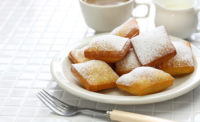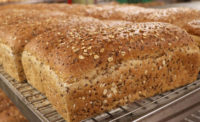George De Pasquale has devoted his life to baking.
“Even as a kid I loved the neighborhood bakery and baking bread at home,” recalls De Pasquale. “I’m Italian-American. I grew up on Long Island in an Italian neighborhood where on Sunday, you wouldn’t know you’re in America. The Italian bakery was right around the corner. My mom would send me over there. I loved the atmosphere. You had to go into the bakery to buy the bread. They didn’t have a storefront. They just had a rack.”
“I remember the smell of that bakery to this day,” continues De Pasquale. “It’s the same smell that hits me when I walk into my bakery.”
Romance aside, getting into baking was a necessity for De Pasquale. “I was 20 years old and a bass player—a starving musician. I needed a job, and the job I got was at a bakery. I never looked back.”
Today, as founder and head baker at The Essential Baking Co. in Seattle—which was the first certified-organic and non-GMO bakery in the Pacific Northwest—he brings his baked goods to the greater Seattle area via three cafés and regional wholesale direct store delivery (DSD) throughout the Pacific Northwest.
The Essential Baking Co. also now reaches a national audience with its Take & Bake line of artisan sourdough bâtards and baguettes, which get a notable 190-day ambient shelf life thanks to modified-atmosphere packaging (MAP).
Essential origins
De Pasquale founded The Essential Baking Co. in 1994 with his friend, the late Jeff Fairhall, who tragically succumbed to brain cancer in 2007 at the age of 49.
In the late 1980s, Fairhall launched Essential Foods, a startup he founded, delivering sandwiches to Seattle-area retailers on his bicycle.
By the early 1990s, De Pasquale had been baking in the Bay Area for a number of years, and he and Fairhall started brainstorming a way to pool their talents. They finally decided to take a chance on a new business together. “I relocated to Seattle and started R&D in the summer of 1993,” says De Pasquale. “After a few months of testing the products at farmers’ markets, the response was encouraging.” The partners leased a basement space, bought some used equipment and opened the doors for business in March of 1994.
“Opening a bakery with a friend, in a city I already had fallen in love with, seemed like a golden opportunity,” says De Pasquale.
Business grew, and in 1998 The Essential Baking Co. moved to a 30,000-square-foot facility and established its first café. Acquisitions through the years included Parisian Star Desserts and Delphina’s Bakery in Portland, OR.
Growth continued, and a move to the current 60,000-square-foot bakery in south Seattle took place in 2010. In addition to serving as its home for its wholesale baking business, the location also sports another café. A total of three Essential Bakery Cafés now operate in Seattle.
Today, the range of products offered by The Essential Baking Co. includes organic and conventional artisan breads, pastries and desserts distributed to grocery stores, cafés, restaurants, schools and hospitals across the Pacific Northwest—with select product lines going to warehouse/club stores and supermarkets nationwide.
An organic revolution
De Pasquale notes that some of the bakery’s highest volume comes from local foodservice accounts, which tend to order sourdough table bread. “National, and occasionally international, sales in frozen and shelf-stable Take & Bake continue to grow, and we have high hopes for that. Those are also generally sourdough and variety bâtards.” In terms of local retail, he says far and away the best-sellers are a signature Rosemary Diamante bread and traditional baguettes.
Just over half of The Essential Baking Co.’s artisan breads are made with organic flour. “Our line of frozen bake-off and shelf-stable Take & Bake ‘made with organic flour’ breads has taken off, introduced just over a year ago,” says De Pasquale. The bakery also just introduced two varieties of par-baked pizza crusts in shelf-stable MAP. Other recent additions to the lineup include Parker House rolls and butterflake rolls, both of which are selling very well with local and regional foodservice accounts.
“We’re also about to launch a small line of breads made with locally milled organic flours. Specialty and local grains are the next big trend. I’m very excited to keep working with and promoting our local farmers and mills and being part of the agricultural revolution that’s happening here.”
This agricultural revolution was several years in the making, though. A while back, De Pasquale had been thinking about the possibility of sourcing local wheat and reached out to Stephen S. Jones, Ph.D., who is now the director of the Washington State University Bread Lab in Burlington. “He’d been working with local brands and seeing some potential for changing the local grain economy by selecting wheats that do better in Northwest.”
After much experimentation, the area now boasts wheat varieties that are unique to the area, including ‘Espresso’ and ‘Yecora Rojo’ hard red spring wheats. But there was only one small mill doing organic grains. Now, just last year, a larger organic mill went into operation in Burlington to meet the growing demand.
De Pasquale notes that for the bakery’s artisan breads, specialty grocery is a sweet spot, but that the warehouse/club channel is important, as well. “Here in Seattle, even the major retail chains do a lot of specialty products.” The Essential Baking Co. is also among the retail product lineup in the new cutting-edge Amazon Go store in Seattle, which eliminates the checkout process.
The bakery exclusively uses sourdough starters for its bread products. “We have seven different starters that we use to mix and match, combining to make different flavors. When I opened the bakery, the guy who was selling me supplies said that he had a starter that he wanted to give me. ‘It has been with my family for a really long time,’ he said. ‘Do you want some of it?’ He came back with a family tree noting everyone who had been given the starter, and where it had come from. Apparently, it had been in his family since the Gold Rush.”
As the legend goes, his great-great-grandfather was a baker during the Gold Rush and worked for a company that ferried people back and forth between Seattle and Alaska. He reportedly kept his starter in the bottom of his sleeping bag, preserving it for each new batch of bread. That same Gold Rush starter was used by The Essential Baking Co. to create all of the bakery’s original starters.
Today, most of the bakery’s breads use some sort of preferment. All batching is done in house, and the longer-fermentation breads go for 6–8 hours. “I prefer to get everything done in a day,” notes De Pasquale.
The Essential Baking Co. runs four bread lines: one for bâtards and baguettes, one for bâtards and boules, one for buns and rolls, and one that relies on hand-shaping techniques. Pastry remains hands-on and job-oriented. “The bread lines are oriented to the dividers and the products they can process,” says De Pasquale. “We also utilize a co-packer across the street for our gluten-free line, produced in a dedicated gluten-free facility free of allergens.”
While the lines are far from fully automated, some efficiencies have been added through the years. Most recently, The Essential Baking Co. added a stress-free boule divider/rounder and some packaging equipment. “We’re slowly trying to close the gaps between processes and streamlining the packaging,” notes De Pasquale.
The addition of a MAP line has also brought a strategic tool for growth into the The Essential Baking Co. lineup. The ability to offer high-quality artisan breads with a 190-day ambient shelf life holds wide appeal. “It opens up a whole set up distribution channels that don’t rely on freezer,” says De Pasquale.
Next steps to further streamline the operation will likely involve adding conveyors between workstations, notes De Pasquale. “We’ve also started dipping our toe into the waters of lean manufacturing and Six Sigma.”
De Pasquale is quick to note that these improvements are always aligned with the bakery’s core principles. “The emphasis on machinery is to improve the quality of the product first and foremost, and to minimize or eliminate the tough physical aspects of artisan baking. We have no real interest in becoming a high-speed, single-purpose facility. We’re an artisan bakery and will stay that way, even as we grow.”
Competitive advantages
De Pasquale cites Essential Baking’s flexibility and attentive customer service as key competitive advantages. “Our core mission is to nourish our community with artisan goods made with organic and quality ingredients.”
A balance of strong local and regional sales—diversified across retail and foodservice—along with emerging strength on a national level, helps keep the bakery humming. The Essential Baking Co. also brings in contract manufacturing projects and works with retailers on private label lines, on both the West Coast and the East Coast. The bakery is in its second year of being SQF Level 2 certification, which brings assurance to existing and potential customers.
“I’d like to see a bigger national presence and, of course, to stay a stable and important presence in our home community,” says De Pasquale. “We’re in a unique position to be big enough to have a significant impact, but small enough to be responsive and provide close and personal service.”
De Pasquale emphasizes the importance of community. “More than anything, I’m proud of our people. Without them, we’re nothing. Over the years, we’ve had many bakers go out and start their own bakeries or work in other bakeries. We’ve been a launch pad for many people to get solid enough in their own lives to buy homes, get better education for themselves and their children, and all the things that go with that.”
“I’m from a family that came to America to work hard and improve their lot,” continues De Pasquale, “so it feels good to be able to provide a way for other people to have the same opportunities—or better—that my family had. I feel honored and blessed to have made an impact in our community, to have put bread and pastry on people’s tables for so long, and to have such loyal customers.”
AT A GLANCE
Company: The Essential Baking Co.
Headquarters: Seattle
Website: http://essentialbaking.com
Plant size: 60,000 square feet
Number of production lines: 5
Number of employees: 350
Products: Fresh artisan and organic breads, handcrafted pastries, Parisian-style desserts (pies, cakes, individuals), par-baked frozen bake-off breads, shelf-stable breads
Brands: The Essential Baking Company, Parisian Star Bread, Parisian Star Desserts
Key Personnel
Founder & Head Baker: George De Pasquale
CEO: Tom Campanile
Vice President of Sales: Joe Hall
Vice President of Operations: David Ruch
Marketing Manager: Kuanny Yin
Vice President of Finance: Valerie Costello









